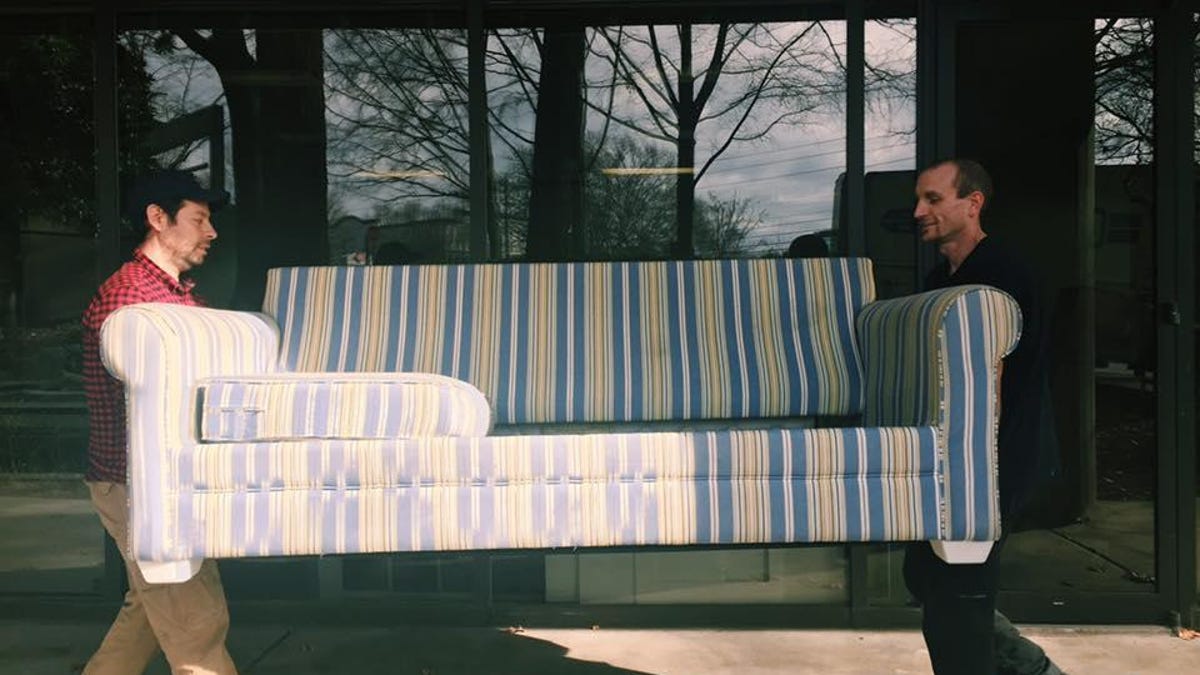Hitching a ride with delivery app Roadie
What do antique furniture, a Jar Jar Binks statue and puppies have in common? They've all been carted across the country using the same on-demand app.

Roadie gig workers Tim and Alonso deliver a couch.
One of the first things Kyle MacLean asked me when we met was, "Are you familiar with the term 'side hustle'?"
I wasn't. He explained it can be anything from a part-time job to driving for Lyft to pet-sitting. His side hustle is doing deliveries for an app called Roadie.
But, MacLean said, "I wouldn't do this as any substantial income."
That's a good thing, because Roadie isn't your typical gig economy startup. It gives drivers an 80 percent cut for each delivery, which range in cost from $8 to about $600. However, unlike other on-demand companies such as Uber , Postmates or Doordash, it's rare for drivers to get more than one delivery per day, and some runs take several days to complete.
Roadie was originally conceived as a different way to deliver stuff. It's not meant for ordering pizza, getting groceries delivered or mailing a letter. It's not a ride-hailing service. Instead, it's for sending unwieldy items long distances with drivers already heading in that same direction. The goal is to have it be a more affordable delivery service than traditional methods, while giving drivers a little extra cash for their trip. People have used the service to send everything from a 7-foot-tall Jar Jar Binks statue to a 50-gallon aquarium, and even puppies.
"When you hit that button on Uber, someone is going somewhere they were not already going," said Roadie CEO Marc Gorlin, explaining a difference between the two apps. With Roadie, "the car is already heading that way."
The Atlanta-based startup launched in 2015 and has since amassed nearly 50,000 drivers nationwide. Roadie offers real-time tracking through the app and insurance coverage for the items being carried. As far as dangerous or illicit packages, Roadie says it has an "open box policy," meaning drivers don't have to deliver something if they don't know what it is.
"We know who our drivers and senders are," Gorlin said.
Roadie has raised $25 million in investment funding and pulled in some big-name backers, such as UPS Capital, Google bigwig Eric Schmidt's TomorrowVentures and rapper Ludacris.
"The basis of the idea is sound," said Brian Solis, principal analyst at market research firm Altimeter. "The fact that the service is backed by UPS, more so than celebrity rapper Ludacris, lends credibility."
On the road
I wanted to see how Roadie worked, so I asked for a ride-along last month. I didn't end up with a long-haul trucker carting some Star Wars character, but I did join in on MacLean's gluten-free cupcake delivery in San Francisco.
MacLean, 45, is tall and energetic with salt-and-pepper hair. He runs his own IT consultant business and puts the extra money he makes with his Roadie side hustle into a vacation fund with his fiance.
We met at a bakery the morning of the delivery. After getting a box of the pink, brown and lavender cupcakes, MacLean took a photo and posted it to the Roadie app. This way the woman who ordered them knew they were on their way. Then we hopped into MacLean's light-green hybrid SUV and set off.
With Roadie, as with most other on-demand apps, drivers are responsible for all costs associated with the work. This includes gas, parking, speeding tickets and car maintenance. So having a hybrid helps. Avoiding paid parking does, too.
When we pulled up to the cupcake delivery spot, an office building in downtown San Francisco, we double-parked out front and asked the woman to meet us in the lobby. That way MacLean didn't have to feed a meter and could also keep an eye out for the parking police.
Meredith Bordoni, who ordered the cupcakes, said it was the second time she'd used the Roadie app. She needed to get the cupcakes for a work celebration. She paid $12 for the cross-town delivery. Of that $12, MacLean got $8 and Roadie got $2.
Cupcakes aren't the kind of item someone would normally get delivered with Roadie. Usually it's bigger things. MacLean said he's delivered a bed, an oversize picture frame and a load of wood planks.
It's also typically used for longer distances.
For example, say you live in California and buy a vintage armoire on Craigslist from someone in Nevada. You can use Roadie to get it delivered for probably less than it'd cost with UPS, FedEx or the US Postal Service. Big-ticket items going a few hundred miles usually cost $100 to $200 with Roadie. For UPS, such a delivery would cost around $200 to $300.
"If you've got a chandelier going to Florida … [with traditional delivery] it bounces through four trucks and an airplane to safely get there," Gorlin said. "Now you've got a much more affordable way for anything fine or fancy, or bigger and bulkier."
For drivers, doing a Roadie delivery usually isn't worthwhile unless they're headed in that direction already. MacLean said he once delivered antique furniture to Portland, Oregon, because he was already going on a road trip up north. He said his Roadie payout covered his gas.
"If I'm going to be out doing something like this, I want the numbers to work out for me," MacLean said.
For the cupcake delivery, MacLean said he had a client meeting downtown that day. After handing the cupcakes over to Bordoni, he asked me to watch his car while he ran over to a coffee shop next door.
"I got a big latte and a breakfast sandwich," he told me when he got back. "So it paid for my breakfast."
Batteries Not Included: The CNET team shares experiences that remind us why tech stuff is cool.
CNET Magazine: Check out a sampling of the stories you'll find in CNET's newsstand edition.

